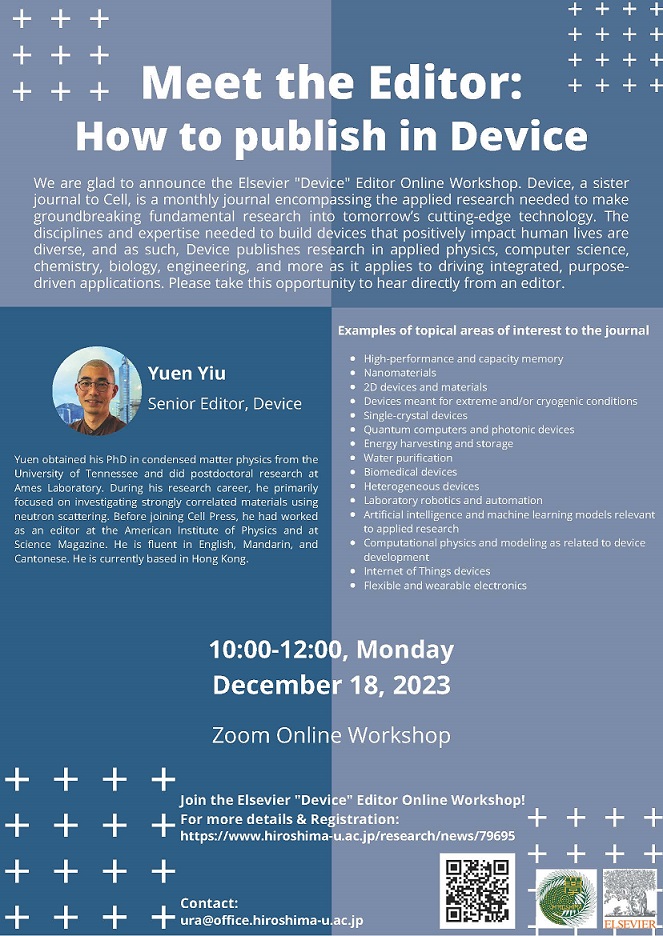【Contact】
Headquarters for Research in Collaborative Sciences Enabling the Future
ura■office.hiroshima-u.ac.jp (Please replace ■ with @)
Japanese >
We are glad to announce that the Elsevier "Device" Editor Online Workshop will be held as shown below. Device, a sister journal to Cell, is a monthly journal encompassing the applied research needed to make groundbreaking fundamental research into tomorrow’s cutting-edge technology. The disciplines and expertise needed to build devices that positively impact human lives are diverse, and as such, Device publishes research in applied physics, computer science, chemistry, biology, engineering, and more as it applies to driving integrated, purpose-driven applications. Please take this opportunity to hear directly from an editor.
* It is confirmed that editors of "Matter" and "Cell Reports Physical Science" will join the Open Discussion session.
◆◆◆◆◆
Elsevier "Device" Editor Online Workshop
"Meet the Editor: How to publish in Device"
【Date & Time】 10:00 - 12:00, Monday, December 18
【Participation】 Zoom
【Registration】 https://forms.office.com/r/WgYmLisxFb
【Program】
Opening remarks (5 min)
① Talk session from Dr, Yuen Yi, Device Senior Editor (45–60 mins)
In this talk, Yuen will give a crash course on how to craft a research or an opinion article, and go over some common pitfalls and missed opportunities when promoting your research. He will also briefly share his thoughts on the use of AI in scientific publishing and other ethical concerns. Finally, he will give an overview on the journal ecosystem of Cell Press and peel back the curtains to share some insider knowledge as a full-time editor.
You can also learn more about;
- Trends and topics in fields that Hiroshima University is particularly focused on.
- What is special about this new journal "Device" compared with existing ones, how it is positioned within Cell Press series, and the journal's strategy for the future
- Published Trends such as the Author's region, titles or experience.
② Interactive communication & discussion session (30 mins)
Yuen will give feedback for provided proposals from participants that are envisioned to submit to Device.
③ Open Discussion session (30 mins)
In this session, editors form other Cell Press journals may join in. You will get insights from a broader scope on various scientific field.
* Dr. Yan Li (Scientific editor, "Matter" and "Cell Reports Physical Science") and Dr. Qiuming Ma (Scientific editor, "Cell Reports Physical Science") will join this session.

Basic Information About Device:
https://www.cell.com/device/aims
Device, a sister journal to Cell, is a monthly journal encompassing the applied research needed to make groundbreaking fundamental research into tomorrow’s cutting-edge technology. The disciplines and expertise needed to build devices that positively impact human lives are diverse, and as such, Device publishes research in applied physics, computer science, chemistry, biology, engineering, and more as it applies to driving integrated, purpose-driven applications. Examples of topical areas of interest to the journal include but are by no means limited to:
- High-performance and capacity memory
- Nanomaterials
- 2D devices and materials
- Devices meant for extreme and/or cryogenic conditions
- Single-crystal devices
- Quantum computers and photonic devices
- Energy harvesting and storage
- Water purification
- Biomedical devices
- Heterogeneous devices
- Laboratory robotics and automation
- Artificial intelligence and machine learning models relevant to applied research
- Computational physics and modeling as related to device development
- Internet of Things devices
- Flexible and wearable electronics
A key focus is on the integration of materials and concepts at multiple levels across the device-development pipeline. Inventing a new material is only part of the work required to implement it in a practically useful setting, much like an material that performs best under vacuum in initial studies may not be the ideal structure once real-world conditions are required. This is to say that Device prioritizes the form as well as the function of the advances considered in submitted research.
Device highlights real-world implications of the research published where appropriate. Authors are encouraged to highlight and amplify the implications, challenges, and opportunities of their work across the entire field and beyond. Device purposefully explores the sustainability, accessibility, ethics, and socioeconomic implications of device research throughout the entire journal.


 Home
Home

